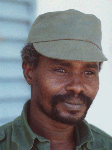

Human Rights Watch - Français
Afrique: Grands Lacs
Etablir une Cour Criminelle Internationale Efficace
L'affaire Habré
A propos de Human Rights Watch
Recherche
Rapports de Human Rights Watch
| Cover letter to the United Nations Committee Against Torture | Communiqués de presse |
April 18, 2001
Secretary
United Nations Committee Against Torture
Office of the High Commissioner for Human Rights
Palais Wilson
52 rue de Pâquis
1211 Geneva
Switzerland
Re: Souleymane Guengueng et al v. Senegal - Communication; request for interim measures of protection
Dear Sirs:
Please find enclosed a communication against Senegal under Article 22 of the Torture Convention from seven Chadian torture victims, whom I represent.
The authors of the communication had instituted criminal proceedings as parties civiles in Senegal against the exiled Chadian dictator Hissène Habré, who was responsible for their torture. Habré was indicted and placed under house arrest but, after apparent government interference with the independence of the judiciary, the Court of Appeals ruled in July 2000 that under Senegalese law, its courts were not competent to prosecute acts of torture committed outside of Senegal. Although the United Nations Special Rapporteurs on the Independence of Judges and Lawyers and Torture "expressed their concern to the Government of Senegal over the circumstances surrounding the recent dismissal of charges" and "reminded the Government of Senegal of its obligations under the 1984 Convention Against Torture and Other Cruel, Inhuman or Degrading Treatment and Punishment to which it is party," the Cour de Cassation, Senegal's court of final appeals, upheld the ruling on March 20, 2001. The Cour de Cassation said
" Qu'aucun texte de procédure ne reconnaît une compétence universelle aux juridictions sénégalaises en vue de poursuivre et de juger, s'ils sont trouvés sur le territoire de la République, les présumés auteurs ou complices de faits [de torture] … lorsque ces faits ont été commis hors du Sénégal par des étrangers ; que la présence au Sénégal d'Hissène Habré ne saurait à elle seule justifiées les poursuites intentées contre lui".
The basis of the communication is that Senegal violated:
- Article 5 of the Torture Convention by failing to establish its jurisdiction over the crime of torture committed abroad in cases where the alleged offender is present on its territory and
- Article 7 of the Torture Convention by failing to prosecute or extradite Habré.
The authors ask the Committee to recommend that Senegal remedy the violations by
-amending its legislation to establish its jurisdiction over the crime of torture committed abroad in cases where the alleged offender is present on its territory, in accordance with Article 5 (2) of the Convention, and
-by either extraditing Hissène Habré or submitting the case against Habré to its competent authorities for the purpose of prosecution, in accordance with Article 7 of the Convention.
Secondarily, if Senegal fails to extradite or prosecute Habré, as the authors ask the Committee to recommend, the authors would ask the Committee to recommend that Senegal compensate them for their losses.
The communication also asks the Committee to recommend interim measures of protection under CAT Rules of Procedure 108 (9) to prevent Hissène Habré from leaving Senegal (and probably going to a country which has not ratified the Torture Convention) except pursuant to an extradition demand. If Hissène Habré leaves Senegal, the authors will suffer irreparable harm because there will likely be no possibility to bring the man responsible for their torture, Hissène Habré, to justice, and there will thus be no means of remedying the violation of Article 7 which they have suffered. Indeed, Senegal would incur a supplemental violation of the Convention by letting Habré flee. Having initiated the prosecution of Habré, the author/plaintiffs have a right to see Habré extradited or prosecuted under Article 7. The victims' right to bring Habré to justice is implicit in their right to a remedy, their right to compensation and their right to reparations, and has been recognized by U.N. rapporteurs such as Joinet and van Boven.
The urgency of this matter comes because Senegal's President Abdoulaye Wade declared publicly on 7 April that he had given Habré one month to leave Senegal (we do not know from when). In addition, criminal proceedings against Habré have been initiated (not by the present victims/authors) in Belgium, and the authors are concerned that any request for extradition by Belgium, as well as any relief recommended by the Committee against Torture (in particular the prosecution or extradition of Habré pursuant to Article 7), would be frustrated if Habré had already left Senegal.
I have been appointed as representative and legal counsel of the victims. This communication is supported by Human Rights Watch as well as the International Federation of Human Rights Leagues (FIDH), Interights, the African Assembly for the Defense of Human Rights (RADDHO), the Chadian Association for the Promotion and Defense of Human Rights, the Chadian League for Human Rights (LTDH), the National Organization for Human Rights (Senegal), and Agir Ensemble pour les Droits de l'Homme.
A number of other materials on the Habré case can be found at http://www.hrw.org/french/themes/habre.htm
I have the honor to remain,
Yours truly,
Reed Brody
Advocacy Director
Human Rights Watch
350 5th Ave, 34th Fl.
New York, NY 10118-3299
tel: 1-212-216-1206
fax: 1-212-736-1300
email: brodyr@hrw.org
 © 2000 Corbis-Sygma L'ancien Président tchadien Hissène Habré |
|
|
Documents juridiques Dans la presse |
|
|
|
|
|
|